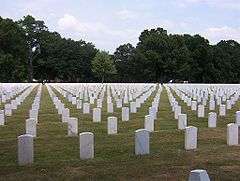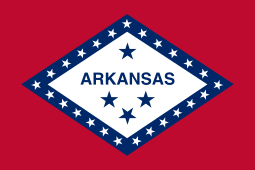Memphis National Cemetery
|
Memphis National Cemetery | |
|
| |
| Location |
3568 Townes Ave Memphis, Tennessee |
|---|---|
| MPS | Civil War Era National Cemeteries MPS |
| NRHP Reference # | 96001233 |
| Added to NRHP | October 10, 1996 |
Memphis National Cemetery is a United States National Cemetery located in the Nutbush neighborhood of the City of Memphis, in Shelby County, Tennessee. Administered by the United States Department of Veterans Affairs, it encompasses 44.2 acres (17.9 ha), and as of the end of 2007, had 42,184 interments.[1]
Several Civil War battlefield cemeteries were transferred to the Memphis National Cemetery after the war.
History
Civil War
Memphis National Cemetery was originally established as Mississippi River National Cemetery when the Union Army forces took control of Memphis during the American Civil War. The cemetery served to inter veterans who died while in the many military hospitals in the delta region of the Mississippi River. After the war, several battlefield cemeteries were transferred to Memphis National Cemetery.[1]
In 1867, about 250 bodies of both Confederate and Union soldiers, some of whom were casualties of the Battle of Fort Pillow in Lauderdale County, were moved from a battlefield cemetery south of Fort Pillow to Memphis National Cemetery to be re-interred in a designated field.[2]
Steamboat Sultana disaster
On the night of April 26, 1865, the steamboat Sultana, overloaded with Union soldiers who had recently been liberated from Confederate POW camps, exploded due to a boiler rupture on the Mississippi River several miles north of Memphis. Many of the dead from that accident are buried in Memphis National Cemetery.
Notable monuments

- The Illinois Monument, a granite and bronze sarcophagus by sculptor Leon Hermant, dedicated in 1929.[1]
- The Minnesota Monument, a granite monument erected in 1916.[1]
Notable interments
- Medal of Honor recipients
- Private James H. Robinson (?–1864), for action during the Civil War, interred in Section H, Grave 4131.[1][3]
- Others
- Winfield S. Cunningham (1900-1986), US Naval Officer, recipient of the Navy Cross for action at Wake Island.[4]
- George W. Grider (1912–1991), U.S. Representative
- Ike Pearson (1917–1985), Major League Baseball player [5]
References
- 1 2 3 4 5 "Memphis National Cemetery". Department of Veterans Affairs. Retrieved 2008-09-21.
- ↑ At Ft. Pillow, the graves had wooden markers. As the bodies were exhumed into wooden coffins, the names, military details and dates were transcribed onto the coffins in chalk. Before they could be reinterred, a thunderstorm washed away much of the information, accounting for the large number of "unknown" civil war markers. Cimprich, John (2005). Fort Pillow, a Civil War Massacre, and Public Memory. Baton Rouge, LA: LSU Press. p. 193. ISBN 0-8071-3110-5.
- ↑ James H. Robinson at Find a Grave
- ↑ "Winfield Scott Cunningham (1900-1986) - Find A Grave Memorial". Find A Grave. Retrieved 27 April 2015.
- ↑ "Isaac O. "Ike" Pearson, III (1917-1985) - Find A Grave Memorial". Find A Grave. Retrieved 27 April 2015.
External links
| Wikimedia Commons has media related to Memphis National Cemetery. |
- National Cemetery Administration
- Memphis National Cemetery
- Historic American Landscapes Survey (HALS) No. TN-3, "Memphis National Cemetery, 3568 Townes Avenue, Memphis, Shelby County, TN", 40 photos, 4 photo caption pages
- U.S. Geological Survey Geographic Names Information System: Memphis National Cemetery
- Memphis National Cemetery at Find a Grave
Coordinates: 35°10′23″N 89°56′13″W / 35.17306°N 89.93694°W







